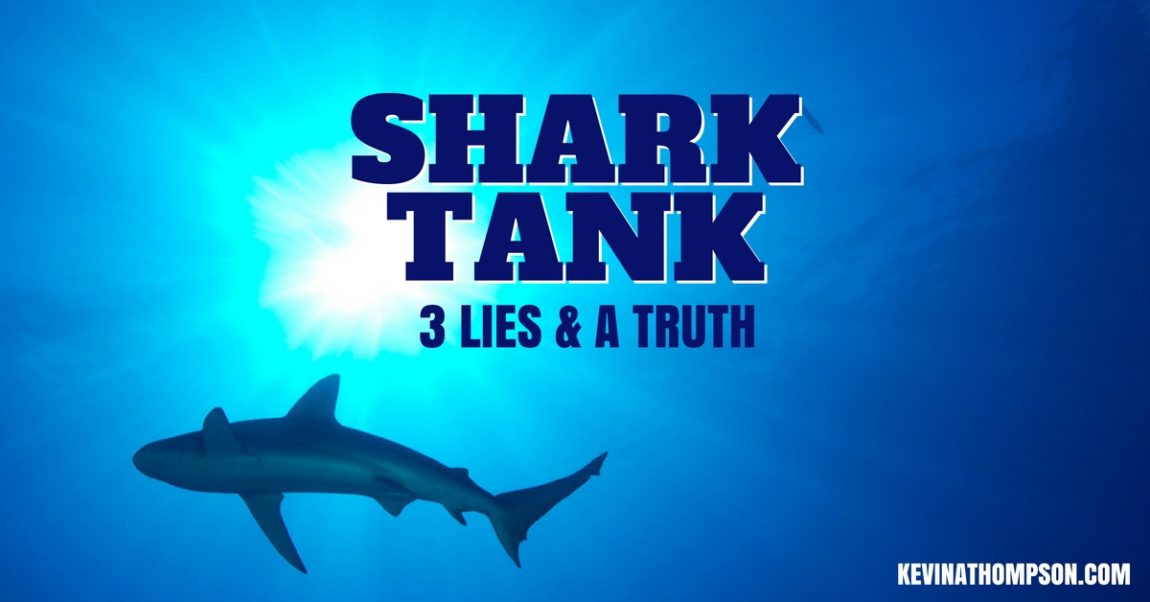Shark Tank is one of our family’s favorite TV shows. I love that my two, elementary age children have their eyes opened to producing products and creating the life they want rather than just assuming they will grow up one day and depend on someone else for a job. In an economy that is drastically different than thirty years ago, it’s important for children to be thinking about the job they might want to create rather than the one they hope to get.
While I love Shark Tank, not everything on the show is true. Even as we watch, there are some things I’m having to point out to my children so they don’t get the wrong message.
3 Lies of Shark Tank
1. Success reveals smarts. A core tenet of the show is that the sharks are smarter than the people pitching to them. The assumption is that success is the ultimate sign of intelligence. It’s not. Smart people can do smart things, only to experience failure. Timing can be off. Markets can change. The person never catches the exact break needed. At the same time, others can catch lightning in the bottle. In spite of themselves, they can experience great success. (See: Remember This When You Experience Success)
While most successful people are smart, there isn’t a direct cause and effect relationship between intelligence and outcomes. While the Sharks should be respected for their experience, it should not be assumed they are the smartest people in the room.
A mistake many people make when associating success and intelligence is we assume success in one area means intelligence in every area.
2. Money produces happiness. The greatest misconception of Shark Tank is that the Sharks are happy. Maybe some are, but I’ll bet several aren’t.
We know Robert Herjavec went through a very difficult time even as the show was experiencing great success. His struggles caused him to contemplate suicide. A major answer to his struggle wasn’t found in money, but was found in serving others.
Money does many things, but it can’t purchase the most important things in life. It’s tempting to look at the Sharks–the private planes, expensive meals, and famous friends–and think they have the best lives. We should know better. (See: Stop Waiting on Your Boss)
It’s not evil, but money also isn’t the source of the good things in life.
3. Bigger is always better. On rare occasions, the Sharks admit that some businesses are better as small businesses, but in most cases, the show perpetuates the assumption that bigger is always better. But many times it’s not. Sometimes a business can experience great success when it is small, but much difficulty when it’s large. While the entrepreneur assumes a bigger business has more influence, more profit, and less problems, the reality can be more struggle, less profit, and a multitude of problems. (See: More Pac-Man, Less Pong)
It’s not wrong to desire growth in a business, but that growth should be viewed logically. If you aren’t happy now, you probably won’t be happy if your business is bigger. If you aren’t profitable on a small scale, you probably won’t be profitable on a large scale. And if you think you have too many problems when a business is local, you can’t imagine the diverse problems when the business is national.
A Truth
Shark Tank perpetuates three lies, but they do tell one great truth. We live in a unique time where the average person has a good deal of control over their economic circumstance. It’s not true for everyone. It’s especially not true for many people outside of the West. But it is very true for many Americans.
While this idea should never be used in judgment toward others–causing us to think the poor should just do better or if someone loses a job that something is wrong with them–it should be used to empower us in the decisions we make. Too many people are waiting on their boss or the company they work for to make their dream come true. They wait and forever will wait for someone else to make their dreams come true. It won’t happen.
If you have the desire, embrace the opportunity we have in this generation and make your dreams come true.



